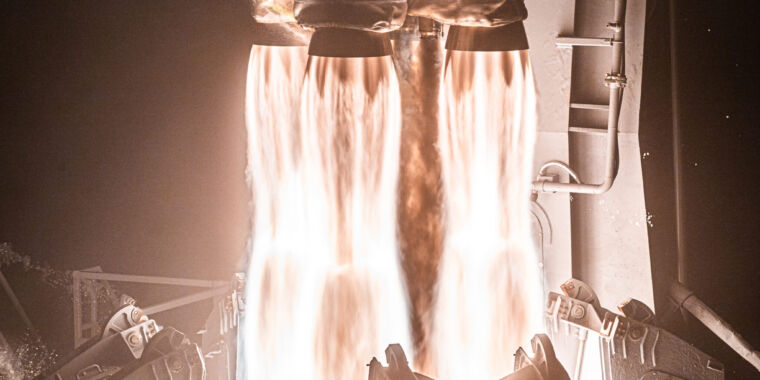Welcome to Issue 7.01 of the Rocket Report! We’re putting this week’s report together a day later than usual because of the Independence Day holiday. Ars is entering its seventh year of publishing this weekly roundup of rocket news, and there’s a lot of it this week, despite the holiday here in the United States. Worldwide, there were 122 launches that flew to orbit or beyond in the first half of 2024, up from 91 during the same period last year.
As always, we welcome reader submissions, and if you don’t want to miss an issue, subscribe using the box below (the form will not appear on AMP versions of the site). Each report includes information on small, medium, and heavy rockets, as well as a quick look ahead to the next three launches on the calendar.

Firefly launches its fifth Alpha flight. Firefly Aerospace launched eight CubeSats into orbit on a NASA-funded mission during the first flight of the company’s Alpha rocket since an upper stage failure more than six months ago, Space News reported. The two-stage Alpha rocket lifted off Wednesday night from Vandenberg Space Force Base in California, two days after a ground-based equipment problem aborted the launch just before engine ignition. The eight CubeSats are coming from NASA centers and universities for a series of educational, research and technology demonstration missions. This was the fifth flight of Firefly’s Alpha rocket, which is capable of delivering about a metric ton of payload to low-Earth orbit.
Resolution of anomaly … This was the fifth flight of an Alpha rocket since 2021 and the fourth Alpha flight to reach orbit. But the last Alpha launch in December failed to place its Lockheed Martin payload into orbit due to a problem during the second-stage engine re-ignition. In this week’s launch, Alpha deployed its NASA-sponsored payload after a single second-stage burn, then completed a successful engine re-ignition for a plane-swap maneuver. Engineers attributed the problem on the last Alpha flight to a software glitch. (Submitted by Ken the Bin)
Two companies added to DoD’s launch pool. Blue Origin and Stoke Space Technologies — neither of which have yet reached orbit — have been approved by the U.S. Space Force to compete for future small payload launches, Breaking Defense reports. Blue Origin and Stoke Space join a list of launch companies eligible to compete for launch mission contracts the Space Force is putting out to bid through the Orbital Services Program-4 (OSP-4) contract. Under the contract, Space Systems Command will procure launch services for payloads 400 pounds (180 kilograms) or larger, allowing for launches 12 to 24 months after a mission contract award. The OSP-4 contract emphasizes “small orbital launch capabilities and launch solutions for tactically responsive space mission needs,” said Lt. Col. Steve Hendershot, chief of Space Systems Command’s small launch and objectives branch.
An even dozen … Blue Origin aims to launch its orbital-class New Glenn rocket for the first time in late September, while Stoke Space aims to fly its Nova rocket on an orbital test flight next year. The addition of these two companies means that 12 bidders are eligible to bid on OSP-4 task orders. The other companies are ABL Space Systems, Aevum, Astra, Firefly Aerospace, Northrop Grumman, Relativity Space, Rocket Lab, SpaceX, United Launch Alliance and X-Bow. (Submitted by Ken the Bin and brianrhurley)
Italian startup tests a small rocket. Italian rocket maker Sidereus Space Dynamics has completed the first integrated systems test of its EOS rocket, European Spaceflight reports. The test took place Sunday and resulted in a firing of the rocket’s kerosene/liquid oxygen MR-5 main engine for about 11 seconds. The EOS rocket is a new design that uses a single-stage-to-orbit architecture, with the reusable booster returning to Earth from orbit for recovery under a parafoil. The rocket is less than 14 feet (4.2 meters) tall and can carry about 29 pounds (13 kilograms) of payload to low Earth orbit.
A lean operation …After completing integrated ground testing, the company will conduct the first low-altitude EOS test flights. Founded in 2019, Sidereus has raised €6.6 million ($7.1 million) to fund development of the EOS rocket. While this is a fraction of the funding raised by other European launch startups such as Isar Aerospace, MaiaSpace and Orbex, Sidereus CEO Mattia Barbarossa has previously stated that the company plans to “reimagine space travel in a fraction of the time and with limited resources.” (Submitted by EllPeaTea and Ken the Bin)
